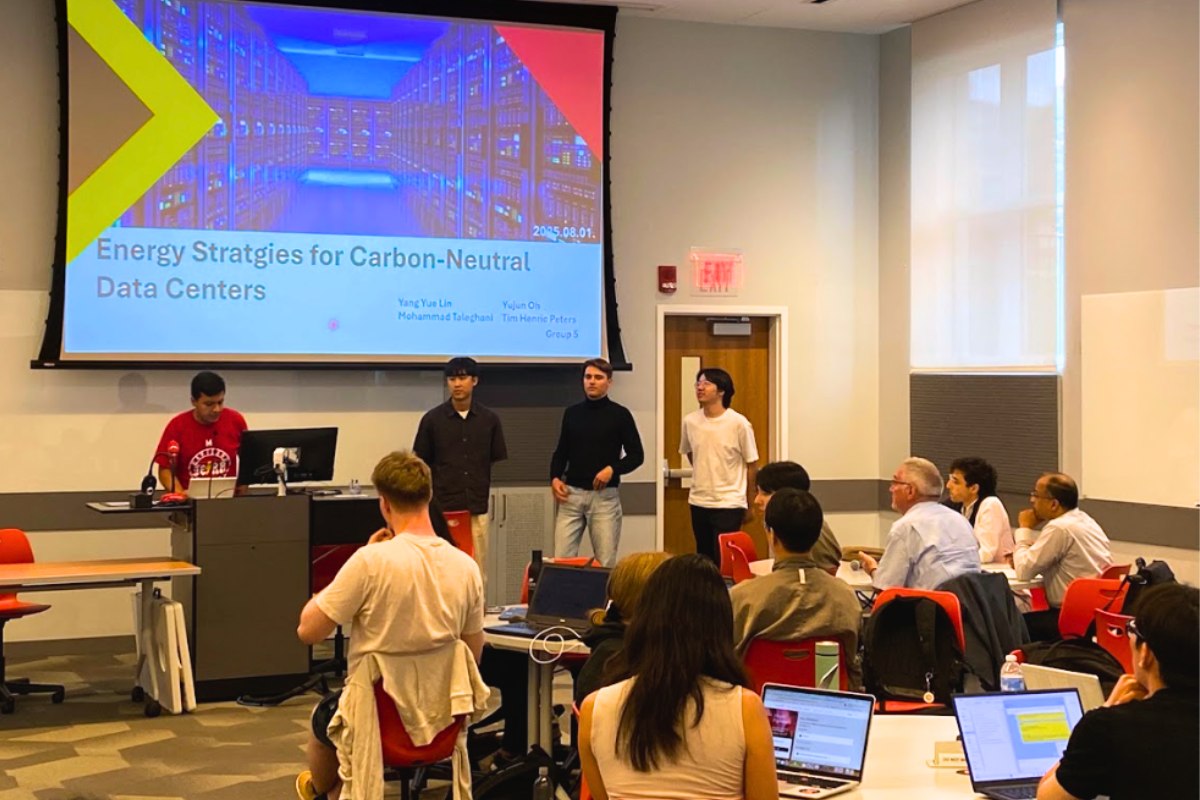International Joint Course in Sustainable Energy Conversion & the Environment
This summer, earn 3 credits for ENME701, while traveling abroad to collaborate with international students on sustainable energy solutions.
This summer, earn 3 credits for ENME701, while traveling abroad to collaborate with international students on sustainable energy solutions.

UMD students will travel to the vibrant port city of Hamburg, Germany, for the 2026 International Joint Course in Sustainable Energy Conversion & the Environment, where they'll collaborate with students from Hamburg University of Technology(Germany), Korea University, Shanghai Jiao Tong University (China) and Waseda University (Japan). The course location rotates yearly among the five participating universities.
|
|
Course Objectives
|
|
|
2026 LocationHamburg University of Technology welcomes 2026 participants to its campus. Hamburg is a cosmopolitan, modern city known for its rich architectural and cultural history. Participants attend lectures and collaborate on group projects each weekday. During evenings and weekends, they explore the area. |
 |
International PartnershipThe course location rotates among the participating universities: 2026 - Hamburg University of Technology, Germany 2025 - University of Maryland, USA (Read more about the 2025 seminar.) 2023 - Waseda University, Japan 2019 - Korea University, South Korea |
|
|
Who Can EnrollUMD participants enroll in ENME701, summer session, a three-credit, two-week intensive course. Enrollees must be:
If you are interested or would like more information, email Research Professor Yunho Hwang.
|
 Dr. Yuhno Hwang, a Research Professor in the UMD Department of Mechanical Engineering will be among the 2026 instructors.
The 2025 instructors included Cheng-Yi Lee, Yuhno Hwang, Gerhard Schmitz, Hoseong Lee and Niccolò Giannetti. |
InstructorsThe course is co-taught by experts from each of the five participating universities. Tentatively, the 2026 faculty will include: Dr. Niccolò Giannetti is an associate professor at the Institute for Energy and Environmental System at Waseda University in Tokyo, Japan. His research spans a broad range of thermal and energy systems, including heat pump dynamics, solar cooling, absorption systems, natural refrigerants, and the application of machine learning for modeling and optimization. Dr. Yunho Hwang is a research professor of Mechanical Engineering and director of the EEHP Consortium at the Center for Environmental Energy Engineering at the University of Maryland, USA. He is a world-renowned expert in energy efficiency and innovative energy systems research in the field of refrigeration and air-conditioning. Dr. Hoseong Lee is in the Department of Mechanical Engineering at Korea University. His research spans a broad range of energy systems, including heat pump technologies, thermal management for electric vehicles and data centers, and the optimization of plus-energy buildings. Dr. Arne Speerforck is dean of the School of Mechanical Engineering at Hamburg University of Technology and a professor in the university’s Institute of Engineering Thermodynamics. His research focuses on energy-efficient air conditioning, heat pumps and energy networks. He previously worked as a visiting scholar with UMD’s Center for Environmental Energy Engineering. Dr. Gerhard Schmitz is professor emeritus for thermodynamics in the Department of Mechanical Engineering at Hamburg University of Technology (TUHH). His research focuses on modeling and analyzing of complex energy systems. Dr. Zhenyuan Xu is in the School of Mechanical Engineering at Shanghai Jiao Tong University. His research focuses on the efficient utilization of solar thermal energy and waste heat with desalination, thermal storage and heat pumps. Dr. Baowen Zhou is in the School of Mechanical Engineering at Shanghai Jiao Tong University. His research is focused on developing the new-generation Carbon-Neutral Energy Device, System and Solution for green hydrogen and renewable fuels, metal-air batteries, and waste valorization. |